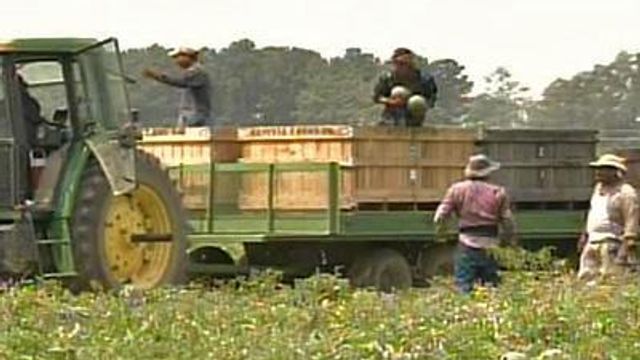Heat Harms Crops, Farm Workers
With dry, hot weather hitting North Carolina, farmers are working overtime to save their crops - and their workers' health.
Posted — UpdatedIn Robeson County alone, about a quarter of what's in the fields now - roughly worth $20 million - has been lost to the drought conditions, according to the director of the county's Agriculture Cooperative Extension Service.
Everett Davis said he is trying to win support from Gov. Mike Easley to have the county declared a disaster area so farmers can apply for government aid, such as feed stock for animals or low-interest loans.
Despite the pressure to bring in crops before the heat withers them, farmers must also husband the health of their workers.
In 2005, four workers died of heat stroke on North Carolina farms. In 2006, two farm workers died statewide.
Farmers told WRAL that so far, their workers have not had any heat-related health problems, but they're still taking precautions.
Pete Bailey, who owns a tobacco farm near Bailey in Wilson County, said he's moved up the work day, so crews are outside from 4 a.m. to 2 p.m. He's also been encouraging workers to take more water breaks.
"The heat is tough, I declare it is," Bailey said.
At Dean's Farm Market in Wilson, workers harvested watermelons by hand as the sun beat down. Manager Don Driver said he would call it quits by 1 p.m. for safety reasons.
"It slows the process down, but this time of year, everything is slowing down a little bit anyway, so don't overdo it," Driver said.
Driver also brought in an air-conditioned van and shade trucks with ice waters for his workers.
Other farmers have crews coming in split shifts this week, working only in the mornings and evenings to avoid the heat.
Along with the heat, dry weather is also taking its toll on farms and their workers.
Two-thirds of the counties statewide are in moderate drought, according to the North Carolina Drought Management Advisory Council. In the southwest, 27 counties are in severe to extreme drought. Six coastal counties are classified as extremely dry.
Corn, tobacco, wheat, soybeans, cotton and other field crops normally generate between $75 million and $80 million in gross receipts for Robeson county farmers. This year, they'll be lucky to get half that, said Kent Wooten, an agent with the county's extension service.
The agency expects the area to lose up to 60 percent of its corn, 70 percent of the soybeans, 50 percent of wheat and 25 percent of cotton.
"This is the worst we've seen," Wooten said. "With temperatures as they are right now, plants are having a hard time surviving. Basically, with corn, it's done what it's going to do."
The last time things were this bad for Rufus Cox was in 1990, when his 700 acres of corn in Fairmont averaged 17 bushels of corn per acre, compared to the usual yield of 138 bushels per acre. This year, he expects to glean 45 bushels an acre.
The soybeans and wheat he also grows on his 2,400-acre spread are expected to come in at about a third of normal levels.
A spattering of rain on Monday brought little relief.
"I don't know if the rain will help the soybeans or not," Cox said. "In our area, we are having trees in the woods that are starting to die, and we haven't cut grass for four weeks in the yard."
In Wilson, Driver shared Cox's desire for a little rain.
"We'd love to see a good soaking rain for a day or two. It'd be very nice," Driver said.
• Credits
Copyright 2024 by WRAL.com and the Associated Press. All rights reserved. This material may not be published, broadcast, rewritten or redistributed.






